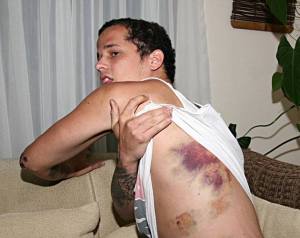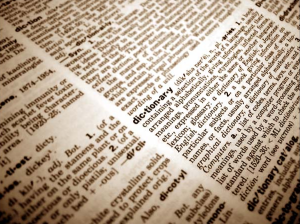Spanish version follows
The short sound signal announces a new posting on my Facebook wall by one of my friends in Venezuela. I pick up the phone, and slide my finger over comments of writers attending the AWP in Seattle this year, religious messages by my friends in Oklahoma, and the gruesome images from the homeland. As part of the diaspora, I have turned to social networks and digital media in search of real time news from the homeland.
I browse the newsfeed with what is beginning to look like morbidity to me. It’s horrible, but I can’t turn away. I need to see. I stop at the picture of a young man lying on a street, his body covered with the tricolor flag of the troubled country. I cry as I read the brief news report. Since February 12, 2014, eighteen Venezuelans, mostly university students, have been killed in confrontations with the National Guard and armed paramilitary forces supporting the regime. Seven of these victims have been killed execution style with gunshots to the head. Additionally, 261 people have been injured with air riffles containing metal pellets, and many have been captured and tortured by the National Guard. At least one victim reports having been sodomized with a rifle while in custody of the regime forces.
I feel the frustration and helplessness experienced by all those who rely on second hand information about the place we love and for which we long. I call my family to make sure everybody is fine. They know less than I do; such is the lack of information inside the country. The regime has taken over most of TV and radio stations. Additionally, there is no printed media due to a shortage of paper. The National Guard has confiscated recording equipment of international correspondents, and deported those who have attempted to cover the news on site.
My parents report that they had just heard the dictator encouraged everybody to celebrate Los Carnavales, a four-day long popular festivity that includes public parties, costumes and merry making, similar, but not quite the same, to Mardi Gras in the US. I described to them what I have seen on the Facebook feed and they said every new information they learn goes through those of us outside of the country, which, in turn, comes to us from tweets and amateur snapshots from the frontline of the barricades, the most common form of protest. What else can we do other than be an echo of the dissenting voices back home?
A friend of mine requests that I save the images I receive. She explains the regime has tapped most phone lines and systematically cleans their tweeter and Facebook accounts from images that could later be used as evidence of human rights violations. I diligently comply, because I need to do something; I just can’t sit with my arms crossed over my chest while the place in which I was born crumbles down from the weight of tyranny. It’s my small and naïve contribution to the resistance, as the protesters call themselves.
The longing for the homeland awakens the need for action. This urges me to meet with other Venezuelans in the city I live. I answer to the call for a vigil in a Catholic church nearby, the second during this week alone. Slowly, my fellow countrymen and women arrive at the church’s community center. The mood is that of a funeral; hushed voices, sad faces. Somebody distributes candles that we light with heavy hearts and tearful eyes. The priest conducts the prayer while a silent video with ghastly pictures of the events back home plays in the background. After the prayer, our voices choke with the lyrics “Gloria al bravo pueblo” our national anthem. Somebody yells, “Venezuela Libre”. Silence and sobbing follow.
When we finish sharing information and words of support, the organizers invite us to the table to enjoy some refreshments, which have been donated by a local businessman of Mexican origin. We grab our sweets and a cup of hot cocoa as the conversations slowly start to fade away and the peaceful attendants retreat to their homes in this cold winter night, conscious that our meeting just helps ease our emotional pain with the reassuring comfort of the crowd.
La corta señal sonora anuncia un nuevo mensaje en mi muro de Facebook por uno de mis amigos de Venezuela. Levanto el teléfono, y corro mi dedo por encima de comentarios de escritores asistentes a la conferencia AWP en Seattle, sobre mensajes religiosos de mis amigos en Oklahoma, y sobre las imagenes horrendas que llegan de mi país. Como parte de la diáspora, me he volcado a las redes sociales y los medios digitales en busca de noticias de la patria en tiempo real.
Paso por los noticieros con lo que comienza a tener un toque de interes morbo. Es horrible, pero no puedo apartar mi vista. Necesito ver. Me detengo en la foto de un joven tirado en la calle, su cuerpo cubierto con la bandera tricolor del país convulsionado. Lloro cuanod leo el corto reportaje noticioso. Desde el 12 de febrero de 2014, dieciocho venezolanos, la mayoría estudiantes universitarios, han sido asesinados en confrontaciones con la Guardia Nacional y las fuerzas paramilitares que apoyan al regimen. Siete de esas víctimas fueron ejecutados con tiros a la cabeza. Además, unos 261 personas han sido heridas con escopetas de aire que contenían perdigones de metal, y muchos otros han sido capturados y torturados por la Guardia Nacional. Al menos una víctiima reportó haber sido violado con un rifle mientras se encontraba en custoida de las fuerzas del régimen.
Siento la frustración y la impotencia de todos aquellos quienes confiamos en información de segunda mano sobre el lugar que amamos y añoramos. Llamo a mi familia para asegurarme que todos estén bien. Ellos saben menos que yo; tal es la falta de información dentro del país. El régimen ha tomado la mayoría de los canales de televisión y estaciones de radio. A eso se suma, la falta de prensa escrita por la falta de papel periódico. La Guardia Nacional ha confiscado los equipos de grabación de corresponsales internacionales, y ha deportado a aquellos que han intentado cubrir las noticias en el lugar de los hechos.
Mis padres reportan que acaban de escuchar al dictador invitar a todos a celebrar El Carnaval, una fiesta popular de cuatro días que incluye fiestas públicas, disfraces y celebraciones, parecido, pero no igual, al Mardi Gras de los Estados Unidos. Les describo a ellos lo que acabo de ver en Facebook, y ellos responden diciendo que se enteran sólo de lo que les contamos los que estamos afuera, lo cual nos llega a nosotros a través de los tweets y las fotos amateur desde la línea frotal de las barricadas, la forma más común de protesta. ¿Qué otra cosa nos queda sino hacer eco de las voces de la desidencia en la patria?
Una amiga me pide que guarde las imágenes que recibo. Ella explica que el régimen ha intervenido la mayoría de las líneas telefónicas y sistemáticamente borra de sus cuentas de Facebook y twitter las imágenes que pudieran ser usadas como evidencia de violación a los derechos humanos. Obedesco con diligencia, porque necesito hacer algo; no puedo quedarme de brazos cruzados mientras el lugar en el que nací se desmorona bajo el peso de la tiranía. Es mi pequeña, y hasta naïve, contribución a la resistencia, como los protestantes se llaman a si mismos.
El anhelo por la patria me despierta la necesidad de acción. Esto me urge a reunirme con otros venezolanos en la ciudad donde vivo. Respondo al llamado a una vigilia en una iglesia católica cercana, la segunda vigilia en una semana. Lentamente, mis compatriotas llegan al centro comunitario de la iglesia. El ambiente es de funeral: las voces bajas, los rostros tristes. Alguien distribuye velas que encendemos con un peso en el alma y lágrimas en los ojos. El sacerdote inicia la oración mientras en un video silencioso de fondo vemos las fotos de los eventos en Venezuela. Después de la oración, nuestras voces se quiebran con la letra del himno nacional “Gloria al bravo pueblo.” Alguién grita, “Venezuela libre”, lo que es seguido de silencio y sollozos.
Cuando terminamos de compartir información y palabras de apoyo, los organizadores nos invitan a la mesa a compartir unos refrigerios, que han sido donados por un hombre de negocios local de origen Mexicano. Tomamos nuestros dulces y una taza de chocolate mientras las conversaciones cesan lentamente y los asistentes pacíficos regresan a sus casas en esta fría noche de invierno, conscientes de que nuestra reunión sólo ayuda a aliviar el dolor emocional con el consuelo que brinda un grupo.









Lisbeth, I have never experienced this type of loss. But I can relate with your feelings of fear, helplessness, and deep sorrow, as they are common to all; as is the frustration and anger felt when one looks on the destruction of something loved and cherished. Therefore, my friend, I grieve with thee.
Gracias, Doris, Venezuela agradece tu apoyo.